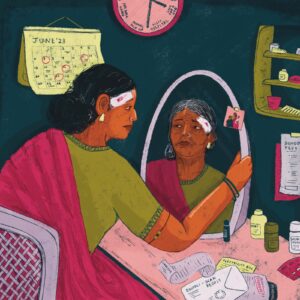Women domestic workers have been severely affected by the Covid-19 pandemic. In India, Countering Backlash partner Gender at Work Consulting – India have been collaborating with domestic workers in Delhi and compiling their stories into a storybook, launching July 2023.
India’s women domestic workers are demanding justice. Anita Kapoor, co-founder of the Shahri Mahila Kaamgar Union (SMKU – Urban Women Worker’s Union), shares how ‘it is important for domestic workers to speak together about what happened during the Covid-19 pandemic and about the issues that we continue to face to this day.’ Here is Roopali’s* story, prepared by Chaitali Haldar, an independent researcher and trainer, with the support of SMKU.
Life uprooted
Roopali’s life was disrupted when she was just 12 years old and studying at school. Her home, in the slum of Gautamnagar in Delhi, India, was identified in 1999 as one of the informal settlements to be demolished in the name of redevelopment and so-called ‘beautification’ of the city.
The experience was terrible for Roopali and her family. After their home was demolished, they ended up living next to a railway track with just a tarpaulin sheet as a roof. They were also miles away from the parents’ place of employment and Roopali’s and her siblings’ school.
‘The warp and weft of relationships, friendships, solidarities with our neighbours and families that wove the fabric of our lives together for so many years had been torn asunder by the relocation.’
After months of trying, Roopali’s family were eventually able to buy a small plot of land after fighting through the bureaucratic red tape of government departments. Even though they had lived in a slum before, they had access to basic services such as water and electricity. In the new location they were deprived of the most essential services. Their daily commute to work was 20 kilometres and Roopali’s and her siblings’ education was severely disrupted.
Roopali and her sisters were blocked by their older brother from going to school as he argued that it was ‘too far away’. At the age of 15, Roopali ended up going to work with her mother as a domestic worker, a job that Roopali would do into her adult life.
Connecting with a domestic workers’ union
Before the Covid-19 pandemic, Roopali was working in three households. She lost these jobs at the start of the pandemic lockdowns and wasn’t even paid the salary that she was owed. During this time, it was near impossible for domestic workers to find employment.
How can one secure employment if there are no jobs available?
It was during this time that Roopali began associating with the SMKU in Delhi. They were providing an open and safe space for domestic workers to access relief and support during the lockdowns. At the time, the government’s Covid-19 welfare services were only accessible online. SMKU ran an information centre which provided people the latest information on support and relief measures. Through SMKU’s support, Roopali was able to obtain both ration and an e-ration card.
Currently, Roopali is working as a cleaner in a family home, earning around INR 4,000 per month. She was supporting her entire family whilst her husband was looking for work during the pandemic. But this is just a temporary job and she is at risk of losing it once the family find a ‘permanent’ replacement. Since Covid-19, there are fewer jobs available and more employers are now wanting domestic workers to be ‘live-in’ and available 24 hours a day. Roopali is facing this all in the midst of health issues, which have become acute after she experienced a serious workplace related injury, that have led her into significant amounts of debt that she and her husband are struggling to pay off. Her current employer is also threatening to fire her if she takes any more time off due to her health conditions. Roopali feels stuck in a spiral of insecurity and old beyond her years.
I feel distressed. Sometimes I feel defeated by life’s circumstances.

Credit: Mrinalini Godara
Roopali works closely with the SMKU, taking part in activities organised by them, encouraging others to join the union, and sharing her joys and sorrows with her fellow women domestic workers.
*Name changed to protect the person’s identity.
This story was originally written in Hindi (translation provided by Sudarsana Kundu and Shraddha Chigateri from Countering Backlash partner organisation Gender at Work Consulting – India).
